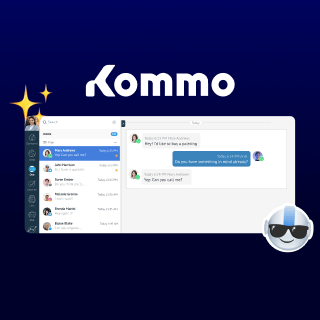Leads are your potential customers.
Do you sell to consumers (B2C)?
Each lead represents an individual you’re working to build a business relationship with.
Do you sell to other businesses (B2B)?
Each lead is a company you’re selling to, or a particular project you have with a company. Of course you’ll also be dealing with individuals at companies, so that’s why leads also have linked contact profiles for each individual you work with.
In Kommo you can work with leads on a zoomed-in level (within the lead’s profile, also known as a lead card) and a zoomed-out level (among other leads in your sales pipeline).
The pipeline visualizes the stages of your entire business relationship. “Winning” a lead means transforming the lead into a customer. “Losing” a lead represents deciding that there is no reason to continue working with them any longer. You can drag a lead to these stages at any time within the sales pipeline.
The Feed
The lead card is divided into two main sections. On the right side is the feed.
The feed contains a complete history of your relationship with the lead: all your interactions and activities, such as calls, tasks, notes, chats, pipeline stage changes and more.
Interacting in the feed
At the bottom you’ll find an area for adding notes, creating tasks, chatting with leads and colleagues and sending emails emails — all from within the lead card! Just click the word “Note” to see all your options.
Subscribing to a lead card
You can also subscribe and unsubscribe users. Subscribed participants will be notified of changes that happen in this lead card. Just click to add/remove participants.
Customizing the feed view
Tired of scrolling through chat messages or another type of data? Click on the eye icon to choose what to show or hide in the feed.
Widgets
Some integrations can be used within the lead card. You will find these on the extreme right. For example, Zendesk or MailChimp.
The “About” Section
The left side of the lead card gives a snapshot of all your lead’s data. Think of it as your lead’s “about” section: contact info, the stage of the relationship, tags, and so on. At the top, you can fill in the lead’s name or leave it blank, and a name will be generated automatically.
💡 Make sure to click save when you fill in information in the lead card.
Kommo also gives you the freedom to create all kinds of custom fields here to suit your business needs.
Grouping “about” data into tabs
To keep your lead data organized, it is grouped into tabs.
Want to keep a list of the products or services that your lead is interested in? In Kommo, you can create inventory catalogs to track all your offerings. Then for each lead, you can easily add the products they’re interested in.
- Click “Setup”
- Click “+” to add a new tab
- Select the product catalog from the dropdown
- Once the tab is added, just click add to attach products to the lead
In the Statistics tab, you can get some useful metrics about the lead, including: the user who made the last update, the user who is most active with the lead and more.
Create your own custom fields and group them into tabs using the “setup” tab.
Creating leads
In addition to importing the leads you already have, there are 3 main ways to create leads in Kommo.
1. Create and open the new lead card
Within the pipeline, click the “+ New Lead” button. This will open up a new lead profile for you to fill in.
2. Create leads without leaving the pipeline
Want to add a new lead, but keep working your pipeline? Click “Quick add” in the left-most stage.
3. Create leads automatically using Digital Pipeline
Digital Pipeline can capture leads from all kinds of sources, eliminating the need for you to waste time on manual lead creation or import. It can grab leads from messenger apps, web forms, calls and emails. Read more about automated incoming leads
Need more help in setting up or troubleshooting? Contact us by sending an email to support@kommo.com or write to us on Facebook.
Not a user yet? Visit our tour page or contact us for a demo.












